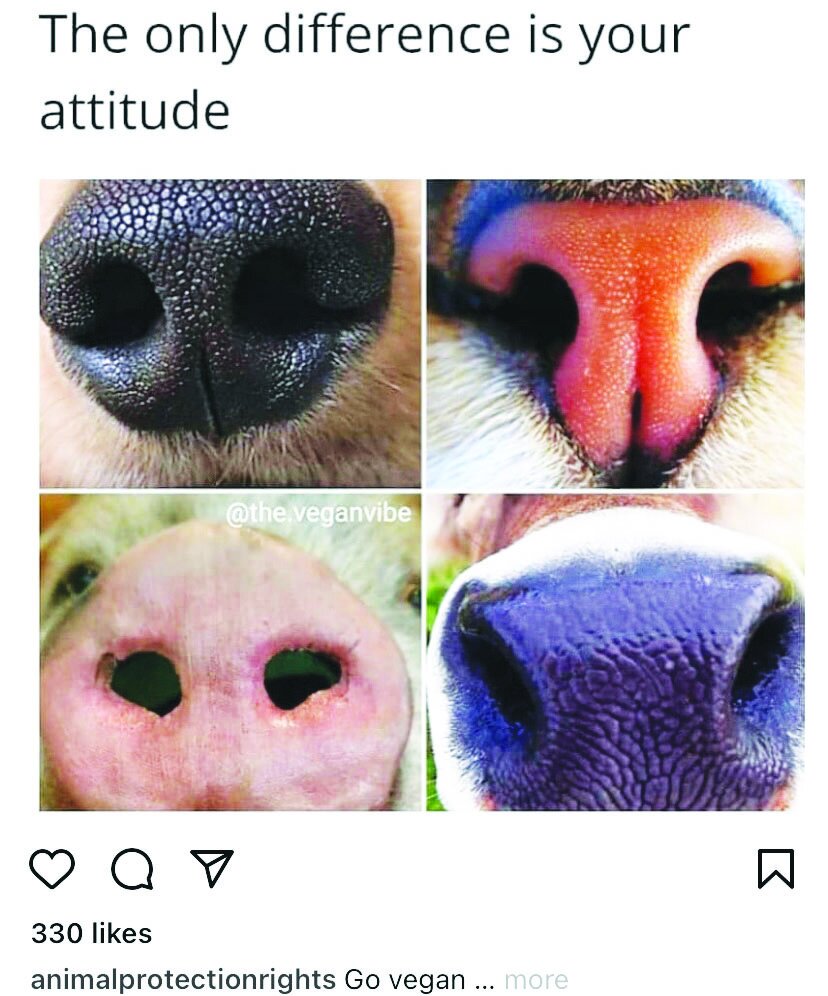Blurred Lines
I saw this photo while scrolling through Instagram earlier this week…I know this is an argument many anti-ags have, and I wanted to explain why the initial point the poster made is ridiculous.
“How is eating a pig any different than eating a dog?”
This question has been asked since the dawn of veganism. And for many, I knew the answer in my heart, but just wasn’t quite sure how to put it into words — until now. It all comes down to one word: domestication.
Domestication is defined as the act or process of taming an animal for human use or companionship.
In a Harvard blog post penned by Katherine J. Wu in May 2018, the author claimed, “when we discuss domestication, we’re referring to the process of adapting wild plants and animals for human use. This definition is frustratingly vague, so we won’t open the entire can of worms: in this column, we’ll focus on pets, so animals intended for human companionship (leaving out plants and animals intended for food or labor).”
However, why wouldn’t we “open that can of worms?” Because that can of worms would diminish any argument anti-ags have against the animal ag sector?
Wu went on to discuss wild animals and feral animals, bringing up some valid points. She said wild animals don’t rely on us, and feral animals are just tame animals adjusting to the wild. But what got me, is that Wu pointed out a shade of grey: the first being that some animals can be tamed, but not domesticated.
I thought back to a funny story about little Reese Alsup. Reese was, at the time of this story, no older than 5 or 6 and frankly was one of the most intelligent kids I’ve ever known. Reese was blessed with a bottle calf one year and proudly proclaimed that, “Daddy said the bottle calf can’t come in the house like the cat because she’s a free defecator.”
As you can imagine, this sentence was absolutely hilarious coming out of a 3-foot-nothing, tow-headed little girl’s mouth — but this sentence also proves a major point: animals such as dogs, cats, and even some rodents can be domesticated… but cows, sows, and horses cannot.
This is an echo of Wu’s comment in her blog post, “In these cases, a single wild animal can be adapted to live alongside humans, take their food, and generally benefit from their presence – but the change is entirely behavioral and can occur within a single animal’s lifespan. Genetic changes do not occur, and the rest of the animal’s species remains wild. What’s more, not all domesticated animals are tame: consider chickens or Spanish fighting bulls.”
Bottom line: livestock can be tamed, but not domesticated.
Don’t get me wrong, I’ve formed many attachments to show animals in my day. Like many of you reading this, I’ve brushed out a horse’s mane and propped up against a heifer at the county fair — but I would never be able to get a 700-pound animal to curl up at the foot of my bed while I watch Netflix. Psychologically speaking, this is why many meat eaters feel it’s perfectly okay to eat a burger or a fried egg, but not shih tzu bacon or hamster jerky.
In response to the photo grabbed from Instagram below, “the only difference is your attitude,” I have this to say: the only difference is not my attitude, it’s the animal’s — and some animals will just never be a pet.

